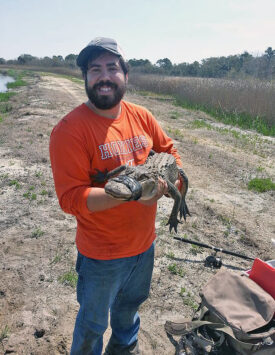Dr. Thomas Galligan is a postdoctoral associate in the Hopkins lab. He is broadly interested in vertebrate endocrinology, conservation physiology, and endocrine disruption.
In the Hopkins lab he is studying hellbender reproductive endocrinology. In collaboration with Dr. Rich Helm (Dept. of Biochemistry) Thomas is using untargeted, mass spectrometry-based techniques to characterize the hormonal underpinnings of paternal behavior in hellbenders and to explore how environmental quality may influence these physiological and behavioral endpoints.
Thomas earned his PhD in Biomedical Sciences (Marine Biomedicine and Environmental Sciences Program) from the Medical University of South Carolina (MUSC) in 2017.
For his dissertation, he studied the impacts of DDT exposure on steroid hormone homeostasis in bottlenose dolphins under the guidance of Drs. Ashley Boggs (National Institute of Standards and Technology) and Lori Schwacke (National Marine Mammal Foundation). His dissertation helped better characterize baseline bottlenose dolphin endocrinology through the use of novel analytical methods and remote sampling techniques. Thomas began his PhD studying thyroid development and disruption in the American alligator with Dr. Louis Guillette Jr. who tragically passed away at the end of Thomas’ second year at MUSC.

